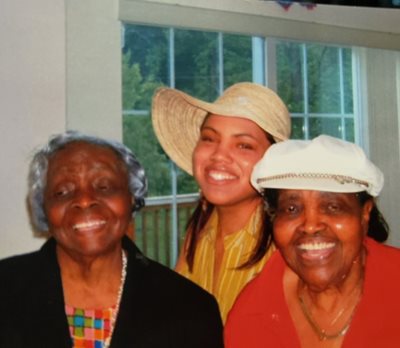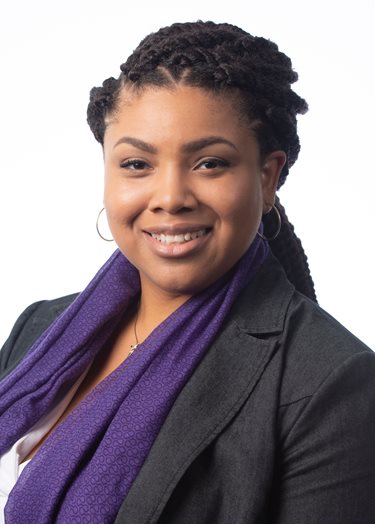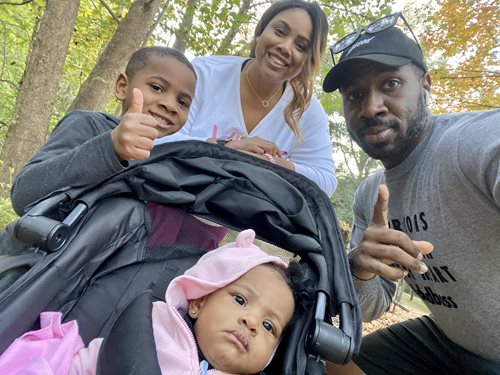
Triple Your Impact This Holiday Season
Triple Your Impact This Holiday Season
Celebrate the holidays with a year-end gift that can go 3x as far to help provide care and support to the millions affected by Alzheimer's disease, and to advance critical research. But please hurry — this 3x Match Challenge ends soon.
Donate NowAlzheimer’s Disease Researcher Ashley Sanderlin, Ph.D., Talks Women in Research and Her Focus on Sleep, Diet and the Brain
Ashley Sanderlin, Ph.D., investigates early interventions for Alzheimer’s disease as a member of the research faculty at the Wake Forest Alzheimer’s Disease Research Center (ADRC).
Ashley, tell us about the focus of your research. What questions are you exploring related to diet and Alzheimer’s?
As a member of the research faculty at Wake Forest, my research focuses on clinical intervention trials in Alzheimer’s disease. I'm really interested how sleep impacts brain health and how diet may be a modifier of sleep. This research may help us learn more about why people develop mild cognitive impairment (MCI).
How did you become interested in Alzheimer’s and dementia research?
 My interest in Alzheimer’s began in high school, when I found out that my paternal grandmother had memory loss. She had MCI, which progressed to Alzheimer’s disease. I was on the honors science track in school, but I wanted to be an entrepreneur and start my own business like my grandmother and other family members. When I found out about her diagnosis, I asked my AP Biology teacher: "What field of science studies the brain?" She told me ‘neuroscience,’ so that is what I set out to do: study the brain, how it works and why it stops working in healthy, smart and amazing people like my grandmother.
My interest in Alzheimer’s began in high school, when I found out that my paternal grandmother had memory loss. She had MCI, which progressed to Alzheimer’s disease. I was on the honors science track in school, but I wanted to be an entrepreneur and start my own business like my grandmother and other family members. When I found out about her diagnosis, I asked my AP Biology teacher: "What field of science studies the brain?" She told me ‘neuroscience,’ so that is what I set out to do: study the brain, how it works and why it stops working in healthy, smart and amazing people like my grandmother.
How did you become interested in clinical trial research?
In 2017, I finished my Ph.D. at Michigan State and had a postdoctoral opportunity lined up after graduation, but right before I started, the lab moved to California. With a one-year-old child, my family in Ohio, and my husband's family in Florida, it wasn't the right move for us.
Shortly after, I presented a poster at the University of Michigan. There I met Dr. Suzanne Craft, the director of the Wake Forest Alzheimer’s Disease Research Center (ADRC). I learned that she was focused on the same research topics that I was interested in. After her keynote presentation, her last slide had big, red letters: “We're looking for postdoctoral fellows!” It was a sign that I had to speak with her.
Spoiler alert: she recruited me! I began working on her Brain Energy for Amyloid Transformation in Alzheimer’s Disease (BEAT-AD) study. Funded by the National Institute on Aging (NIA), I coordinated the study as part of my fellowship: writing protocols, reviewing the grants. That was when I found a gap. There was information on the ketogenic diet and its effects on sleep, but that was not a part of the study we were conducting. I mentioned this in one of our meetings and learned about funding through the Alzheimer's Association. That was when I applied for the Alzheimer's Association Research Fellowship to Promote Diversity.
Tell us about how receiving an Alzheimer’s Association Fellowship has fueled your work and what discoveries in sleep and cognition you are most excited about.
The Alzheimer's Association Research Fellowship to Promote Diversity has been incredibly transformative to my career. I had only been at the Wake Forest ADRC for five months when I applied, so this all happened very quickly. The characteristics of sleep change significantly as we age, but even more so in MCI. The BEAT-AD study has been actively recruiting participants since August 2018. The participants consume a modified Mediterranean ketogenic diet for four months — a pretty intensive diet. We will measure the impact of the experimental diet on sleep, memory and brain function.
 In my development as a graduate student, I worked with neurologists, so I had a clinical training introduction to dementia research and MCI. I'm really interested in the MCI stage: How do people get there? How people stay there in the MCI stage for different lengths of time, and what are the factors that push people over the line into Alzheimer’s and other dementia?
In my development as a graduate student, I worked with neurologists, so I had a clinical training introduction to dementia research and MCI. I'm really interested in the MCI stage: How do people get there? How people stay there in the MCI stage for different lengths of time, and what are the factors that push people over the line into Alzheimer’s and other dementia?
The three-year grant from the Alzheimer’s Association will add sleep measurements to the Phase II BEAT-AD diet intervention trial of a modified Mediterranean ketogenic diet in order to assess the impact of this diet on sleep quality. The grant added a sleep assessment to the study — a one-night home sleep test — as well as questions about sleep, quality of life and neuropsychiatric symptoms. We are recruiting 120 participants with MCI, and we're almost there!
When I met Dr. Craft, I was blown away to hear that nearly half of the studies at the Wake Forest center are lifestyle-based. More recently, Wake Forest became the coordinating center and first study site of the Alzheimer's Association U.S. Study to Protect Brain Health Through Lifestyle Intervention to Reduce Risk (U.S. POINTER).
I know that I am where I need to be, doing the work I was meant to do.
February 11 marks the International Day of Women and Girls in Science. Tell us about your experience with female leadership in the field of Alzheimer’s and dementia research.
There were four women in my Ph.D. cohort and although a lot of graduate programs were beginning to include more women, we don't always see women in leadership positions. I've always been lucky to have female mentors during my undergraduate, graduate and postdoctoral training. My advisors have all been female.
I realized that I was very blessed in my undergraduate experience at Bowling Green State University, being able to work with a female leader of a small lab.
When I was an undergrad, my mentor’s husband was also a professor in the department. Their son would come to the building after school. He would do his homework while we would be doing our research. I realized that this was a career that aligned with my values of having a family while working in this field. And I saw the same in graduate school; my advisor was a neurologist with three children who was very excited for me when I was pregnant with my first child.
It has been so encouraging, having people to relate to; to see women doing life, doing motherhood, doing science work, being engaged in both their work and their family life. My mind was completely opened: that there was a place for me and my clinical interests as a neuroscientist. Seeing Ph.D. women leading in this area is inspiring, and I have learned so much and continue to learn from leaders in the field.
While I always had women to look up to — encouraging, powerful women in my space — I am still not seeing Black women in these spaces. A big part of being a Black woman in this field is trying to navigate this world culturally, and understand the expectations. I’m hoping that I can be a support system and help lead Black women who follow in my footsteps.
How are you mentoring the next generation of Alzheimer’s disease researchers?
I'm a very big picture person and look at things holistically before getting into the weeds. Today, when I work with my students, I don't give them a task — I give them a project. And I'm passionate about this approach because I had those opportunities in my own experience.
At Bowling Green, I created my experimental apparatus. I drew up the diagrams. I did all the experiments, wrote the program protocols and procedures. I had to navigate a lot on my own as a Black woman, despite all the support I did have, and it wasn't until my third year of graduate school that I really got the hang of how I was supposed to dive in. Today I’m doing my best to help other women get a head start in the field by sharing what I learned on my educational journey.
What are you most looking forward to in Alzheimer’s disease research?
 There's so much happening in the field of Alzheimer’s disease research. Not only will more Alzheimer’s disease research be a tool for clinical researchers like me, but it will help inform how we work in underserved communities. We know that there are health disparities that exist, especially within sleep. We need more diversity in clinical trials, and I am proud that early on in the BEAT-AD study, I had a high diversity rate, and working as part of the outreach team at the Wake Forest ADRC, I’m able to communicate the science and connect with people in the community, which is crucial. My next focus will be taking my interest in sleep, diet and cognition to the community, with a focus on African American women.
There's so much happening in the field of Alzheimer’s disease research. Not only will more Alzheimer’s disease research be a tool for clinical researchers like me, but it will help inform how we work in underserved communities. We know that there are health disparities that exist, especially within sleep. We need more diversity in clinical trials, and I am proud that early on in the BEAT-AD study, I had a high diversity rate, and working as part of the outreach team at the Wake Forest ADRC, I’m able to communicate the science and connect with people in the community, which is crucial. My next focus will be taking my interest in sleep, diet and cognition to the community, with a focus on African American women.
As for my own life, it is very busy with both my work and my family. I had a little girl in March, 2020, just as the world shut down. Prior to COVID, my family would try to do things every other weekend: going to see the mountains, getting to know more about North Carolina. Now we're really just trying to stay home — and stay safe together.
About: Dr. Sanderlin was the first African American to attain a Ph.D. in Neuroscience at Michigan State University. She received a Bachelor’s of Science in Biology from Bowling Green State University, where she conducted research as a Ronald E. McNair Scholar. At Michigan State, Dr. Sanderlin worked with Alzheimer’s disease patients and people with MCI as the lead psychometrist in the Department of Neurology. Dr. Sanderlin was awarded multiple honors for her work including the King-Chavez-Parks Future Faculty Fellowship and the 2017 Neuroscience Research Excellence Award. She is married with two children, a four-year-old son and a 10-month old daughter.
Photos in this post: 1. Ashley with her paternal grandmother (left) and great-aunt at her high school graduation party; 2. Ashley's headshot; 3. Ashley with her family.
Related Articles

The first survivor of Alzheimer's is out there, but we won't get there without you.
Donate Now
Learn how Alzheimer’s disease affects the brain.
Take the Brain Tour
